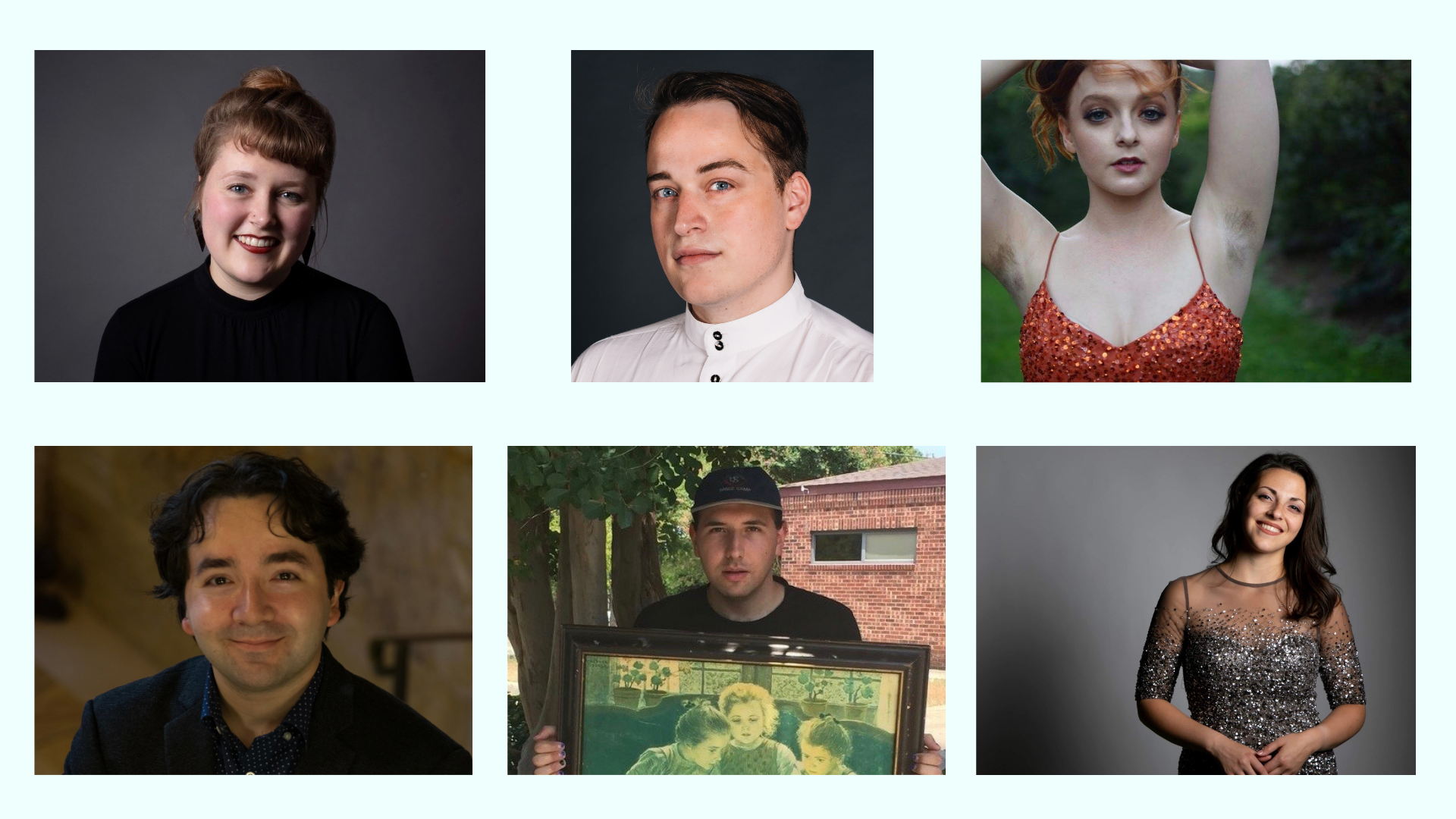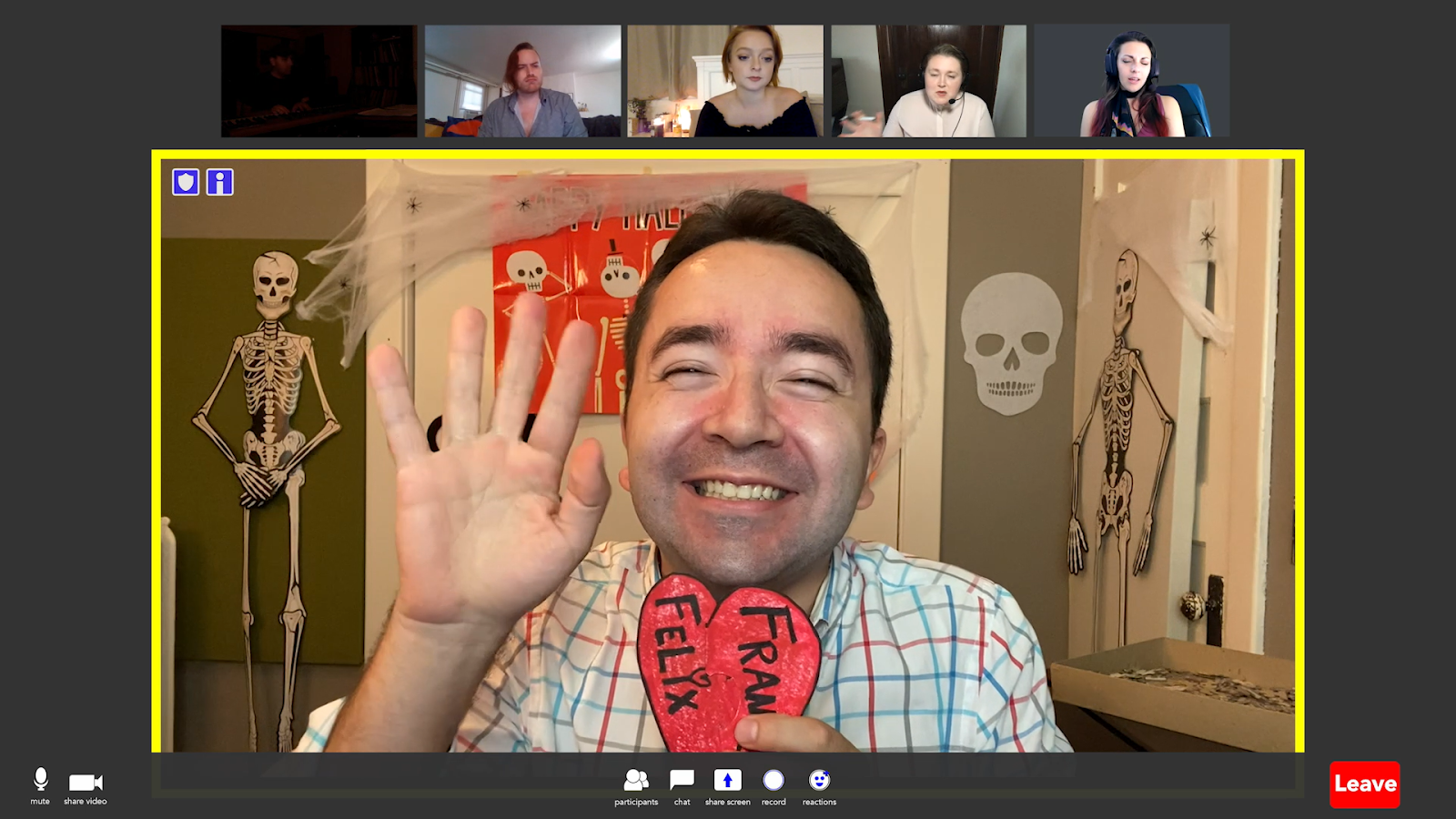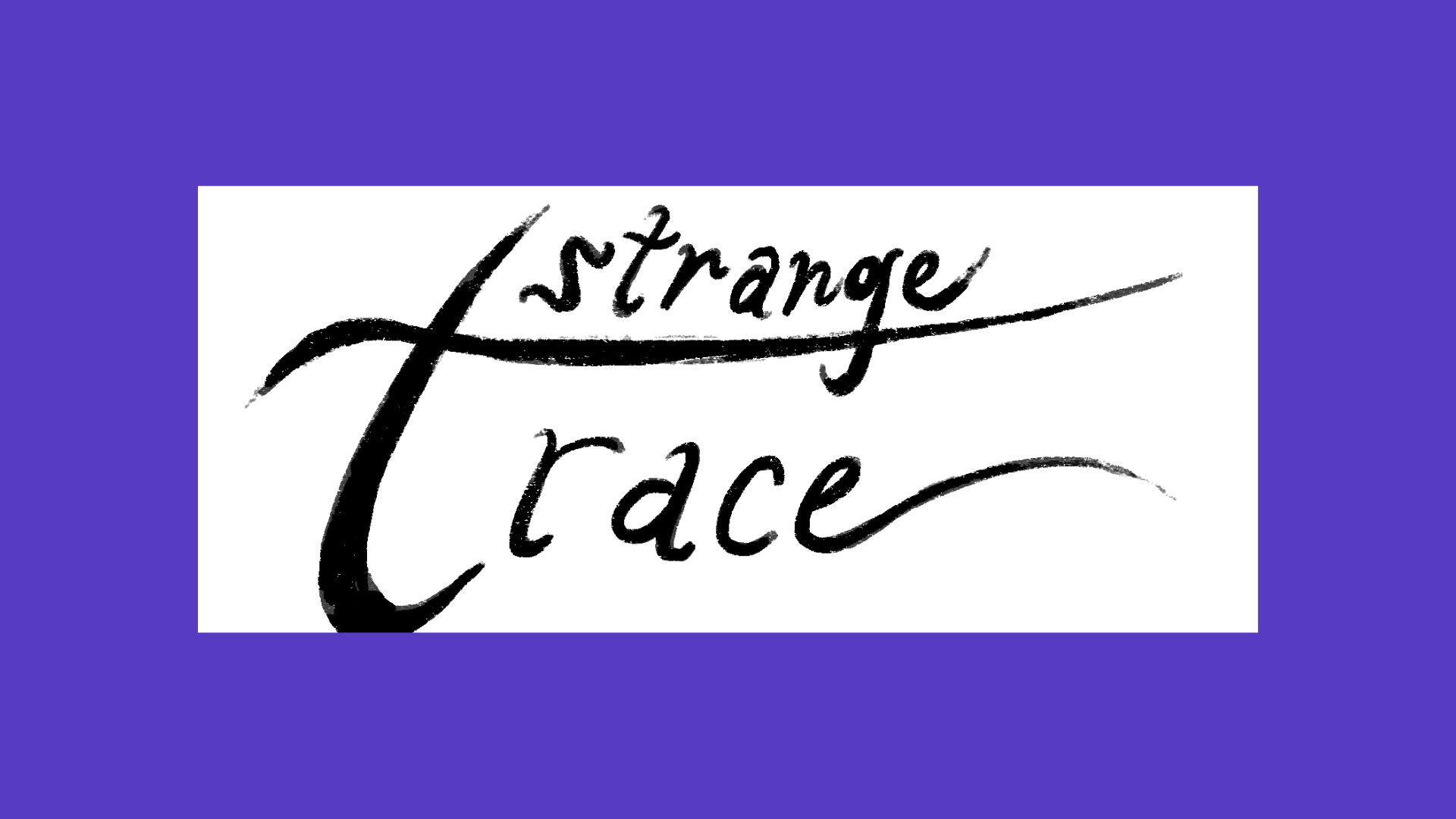Member Spotlight: Strange Trace
Strange Trace founders Frances Kruske, Erin Matthews, Greg Nahabedian, Joshua Scheid, Elena Stabile, and Felix Aguilar Tomlinson knew that they wanted Strange Trace to bring opera into new, more accessible places. Based in Boston, Strange Trace “seeks to holistically redefine the experience of opera, to create new works in nontraditional venues, and to bring together a community of artists and audiences in a fun and supportive environment where all are welcome.”
Strange Trace believes in several core values that they hold themselves accountable to: fun, imagination, support, access, and justice. They hope that their work can bring opera to more people, bring beauty and joy to their audiences, and successfully model healthy collaborative relationships.
They recently premiered their first full show and are making plans (and contingency plans) for a new works festival in spring 2021.

Strange Trace members. From upper left, clockwise: Frances Kruske, Joshua Scheid, Erin Matthews, Elena Stabile, Greg Nahabedian, Felix Aguilar Tomlinson
Tell us about your work or project. What inspired it and how do you hope it will impact people?
We’re a collective of imaginative artists who make new opera in welcoming spaces—for live performance, recording, and digital streaming. We all got together after working together on various projects throughout the years and seeing a real need in the opera world for more organizations that focus on producing new work and encouraging new artists and audiences. The impact is really in sharing this wonderful art that is new opera theater with audiences that have felt alienated by or unwelcome in traditional classical music spaces. And we think that starts with how we, as artists, work with and for each other.
Describe the process you've taken to bring your project to life. What's been involved?
Greg had been talking with all of us about starting an opera company for a couple of years, certainly going back to a production of their first full opera “War is A Racket,” which is where several of us got together. It wasn’t until the pandemic hit though, that Strange Trace kicked off. It’s been a lot of virtual meetings and brainstorming sessions, and a real focus on using the digital resources that we have to make the kind of art that we want to see.
We’ve produced a few short digital projects, and launched our first full show on 10/28 [“The Missing Piece”] which was conceived, written and filmed entirely in isolation.
None of us went into this with much film experience, and Greg was the only one with significant recording experience from their work in the punk world, so we all have been diving into these new skills head-first. We’re lucky to have a couple great advisors who have been helping us organize and funnel our creative energies into the administrative aspects of running an ensemble, and we’ve started building an international network of collaborators, especially composers and writers.
Thus far, by necessity, all of our productions have been completely virtual. This, of course, has presented a huge challenge, but it’s also been exciting. We’re very much looking forward to getting back into live performance as soon as that’s safe for everyone involved, but digital theater is not going away, so it’s been an incredibly useful learning experience for us.
What have been your biggest challenges with your work?
The first challenge we’ve faced is the pretty inescapable reality of theater in the time of COVID, which is when we decided to start our company. It took a lot of brainstorming and discussion to really get to the core of who we want to be as an ensemble, and the kind of art we want to make. Once that became clear, the challenge really became “Okay, now how do we best allocate our resources to make this happen?” We’re all part of this weird economy of piecing together a living, so we have to be very thoughtful about how we use our time. We’re still figuring things out as we go, especially with things changing every day, but we’re coming through this with a good idea of not just how to manage the projects we want to do, but also how to grow as an organization as we do so.

For you, what is the relationship between art and social change? How does your work fit into that relationship?
Art is integral to social change. On the one hand, the stories that we choose to tell as artists of any medium have the potential for impact. At Strange Trace, we want to tell stories that capture the imagination and joy that accompany and fuel social change as we all work toward making a more just world. Of course, we want our shows to have positive messages of justice, but there’s also something about reminding folks of a sublimely hopeful aspect of the work, that we’re all in this together because we firmly believe that we can create a better world. So for us at Strange Trace, we think humor and imagination and even downright silliness is important.
On the other hand, you can look at the actual practices of the industries that make art. At their best, arts organizations can really be wonderful examples of how a group of people can come together, divide up labor, and work toward a common goal. At Strange Trace, we want to create a working environment that is a model for just practices. This is an ever-evolving project. We think it’s important to not just tell the good stories but to also take a hard look at your organization.
What has been most useful to you about your Fractured Atlas membership? Which tools, resources, or services have you taken advantage of?
We’re new to the Fractured Atlas family, but it was one of our first big decisions as an organization. We knew that we needed fiscal sponsorship as we weren’t ready yet to fully incorporate as our own 501(c)(3), but we still wanted to launch ourselves with a nonprofit model. We’re also currently planning our first major fundraising push for our upcoming new works festival, Stencils, for which we’ll be using Fractured Atlas’ campaign tool.
What was your first big win with Fractured Atlas?
We’ve already seen some very generous donations go into our Fractured Atlas account from our supporters. It’s been really encouraging to see that right off the bat we have people behind us, and belonging to Fractured Atlas has been very helpful in making that support happen.
What advice do you have for other artists or organizations using Fractured Atlas services. How can they get the most out of it?
We’re still very new to everything ourselves, but I think the best thing you can do is really try and get your own network of supporters aware of what Fractured Atlas is and what they do for you. A lot of donors, especially newer donors might not be familiar with what fiscal sponsorship is, so whatever you can do to show your supporters how it all works, and how their financial support gets to you can be super beneficial for them.
Any upcoming events that people should know about? What's next for you that we should be keeping an eye out for?
Our next big event is our Stencils Festival. This will happen in the Spring of 2021 and will feature a new one-act show from our member Greg Nahabedian, as well as five new shows, each 10-20 minutes in length, from a really exciting group of artists that submitted to our call for proposals for new works. We’re currently creating plans A, B, and C depending on what safety precautions look like at the time, but we’re hoping that in addition to launching all of the shows virtually, to be able to do a socially-distanced screening in Boston.
To prepare for Stencils, we’re also planning a fun gala event on December 5th. This will be an evening event featuring performances, lots of interactive games and goofs, as well as interviews with our artists and information about the upcoming festival.
You can follow Strange Trace on their website, as well as on Instagram, Twitter, and Facebook. If you want to support Strange Trace, you can donate to them on their Fractured Atlas Fundraising page.
About Nina Berman
Nina Berman is an arts industry worker and ceramicist based in New York City, currently working as Associate Director, Communications and Content at Fractured Atlas. She holds an MA in English from Loyola University Chicago. At Fractured Atlas, she shares tips and strategies for navigating the art world, interviews artists, and writes about creating a more equitable arts ecosystem. Before joining Fractured Atlas, she covered the book publishing industry for an audience of publishers at NetGalley. When she's not writing, she's making ceramics at Centerpoint Ceramics in Brooklyn.


